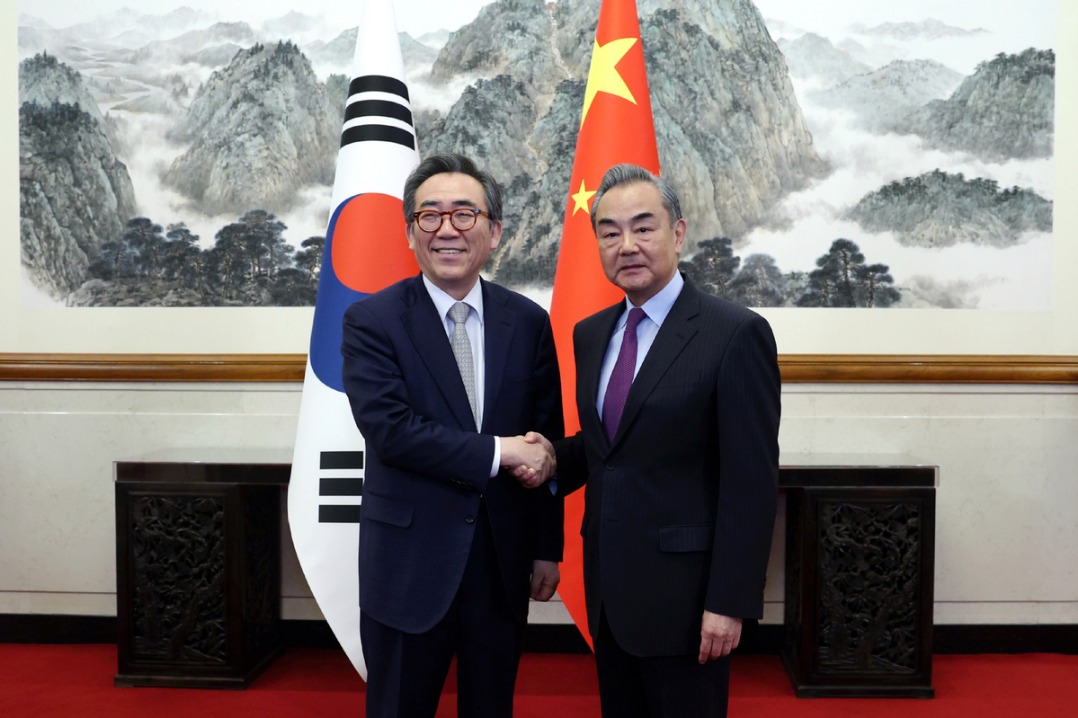


As the Republic of Korea”s Foreign Minister Cho Tae-yul kicked off a visit to China on Monday, expectations were high for the Northeast Asian country to show its sincerity with concrete actions to improve its relations with China.
The ties have worsened in the past two years amid the ROK’s close alignment with the United States.
Cho’s visit marks the first trip to Beijing by an ROK foreign minister in more than six years. Cho met with Foreign Minister Wang Yi in Beijing on Monday and reportedly was to meet with ROK businesspeople in China during the two-day visit.
Cho has stressed the importance of maintaining stable ties with China, its largest trading partner and a key player in resolving the Korean Peninsula issue, since he took office as foreign minister early this year.
The ROK, which currently holds the rotating chair of the trilateral cooperation mechanism with China and Japan, is poised to host the leaders’ meeting of the three countries at the end of this month.
The trilateral meeting was long stalled due to the COVID-19 pandemic, a soured relationship among the three countries, and US disruption that has created obstacles for cooperation by the three nations.
The ROK’s Yonhap News Agency reported on Monday that the Korea Chamber of Commerce and Industry, the Japan Business Federation and the China Council for the Promotion of International Trade plan to co-host a trilateral business summit later this month in Seoul.
Top executives of major companies from the three countries are expected to attend the gathering. Such gatherings have been held since 2009, with a view to expanding Northeast Asian economic cooperation and exchanges.
The business communities of the three countries held their trilateral gathering in 2019 in Chengdu, Sichuan province, on the sidelines of the China-Japan-ROK leaders’ meeting.
During the foreign ministers’ meeting of China, Japan and the ROK in Seoul in November, Foreign Minister Wang pointed out that amid the changing and turbulent international situation, the three countries should serve as “pacesetters” of East Asia cooperation, adhere to open regionalism, oppose drawing ideological lines, and resist turning regional cooperation into bloc politics.
The three countries should also serve as “stabilizers” by safeguarding regional peace and security, act on the vision of common, comprehensive, cooperative and sustainable security, and stick to resolving differences and disputes through dialogue and consultation and by peaceful means, he said.
Experts said the divergences between Beijing and Seoul on the diplomatic front are widening mainly because of ROK politicians’ malicious statements about the Taiwan question, the South China Sea issue and other China-related issues.
Dong Xiangrong, a senior fellow at the National Institute of International Strategy at the Chinese Academy of Social Sciences, said that given the differences in positions on some hot issues between the two countries, it is necessary for both sides to have effective communication and enhance understanding to reduce friction.
Cho’s visit provides an opportunity to open a new phase of communication between China and the ROK, Dong said, adding that it is hoped that after the visit, China-ROK relations can be handled in a more rational and objective manner.
caodesheng@chinadaily.com.cn